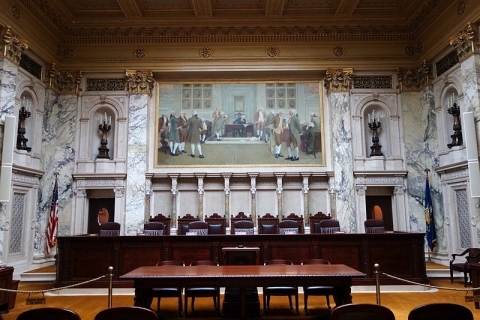On Hold: Frank v. Walker and the Wisconsin Voter ID Law

by: Claire Fravert
For the past three years, Wisconsin has been wrestling over a law that would require all registered voters to provide a valid photo ID at the polls. Wisconsin’s requirement is strict: for instance, a person may present a student ID from an accredited Wisconsin university or college that contains the date of issuance, but that person must also produce a document showing he or she is currently enrolled. Further, the law does not allow a voter to show a Veteran’s ID card or an ID from one of 16 two-year technical colleges in the state. If a voter does not have a qualifying ID, the voter may complete a provisional ballot, but the state will count it only if the voter appears at the municipal clerk’s office with an acceptable ID by 4:00 p.m. on the Friday after the election.
On October 9, 2014, the United States Supreme Court blocked the requirement for Wisconsin voters to show a valid ID at the polls for the November 4, 2014 election. The Supreme Court in essence pressed pause on the validity of the law until after the election. Prior to this ruling, a federal trial court had struck down the statute, but the Seventh Circuit Court of Appeals reversed, holding that the law was constitutional. The Seventh Circuit’s decision would have required Wisconsin to implement its law only weeks before the election. The Supreme Court’s ruling put that decision on hold; after the election, the law will be back in place for the state to implement in 2016, absent any further Supreme Court activity.
The Wisconsin GOP and Governor Scott Walker claim that this law is about the integrity of the electoral process and is designed to reduce the likelihood of in-person voter fraud. Considering that a valid ID is required for everyday activities like driving and buying alcohol, proponents argue it is reasonable to require an ID to vote on Election Day. An American University survey of voters in Indiana, Maryland, and Mississippi found that less than 0.5% of respondents had neither a photo ID nor citizenship documentation.
Critics of the law say it disproportionately burdens poor, older, and minority voters and that in-person voter fraud is extremely rare. The district judge who struck down the law found that roughly 9%, or about 300,000 of all registered voters, lack a qualifying ID. According to the court, the law would disenfranchise these voters, and even could swing the outcome of a close race.
Separate from the underlying merits of whether Wisconsin’s voter ID requirement is lawful, those who objected to the Seventh Circuit’s decision requiring the state to implement the law for 2014 noted that it would have been extremely difficult to ensure that such a large group of voters could obtain a qualifying ID so soon before the election, causing chaos at the polls. They further noted that absentee ballots, which the state had already mailed out, did not include the new ID requirement, adding even more confusion and potentially leading to invalid votes.
The upshot is that Wisconsin’s strict voter ID law is not in place for the 2014 election. Wisconsin has a hotly contested gubernatorial race, so using the ID law, if it had prevented some voters from participating, could have had a significant effect on the outcome. Indeed, the 2010 race for governor was decided by only 124,638 votes out of over 2 million cast, and this year’s race may be closer. As it stands, this ruling allows all eligible voters to cast their ballot even if they do not have an ID that would qualify under the new law – at least for the 2014 election.
